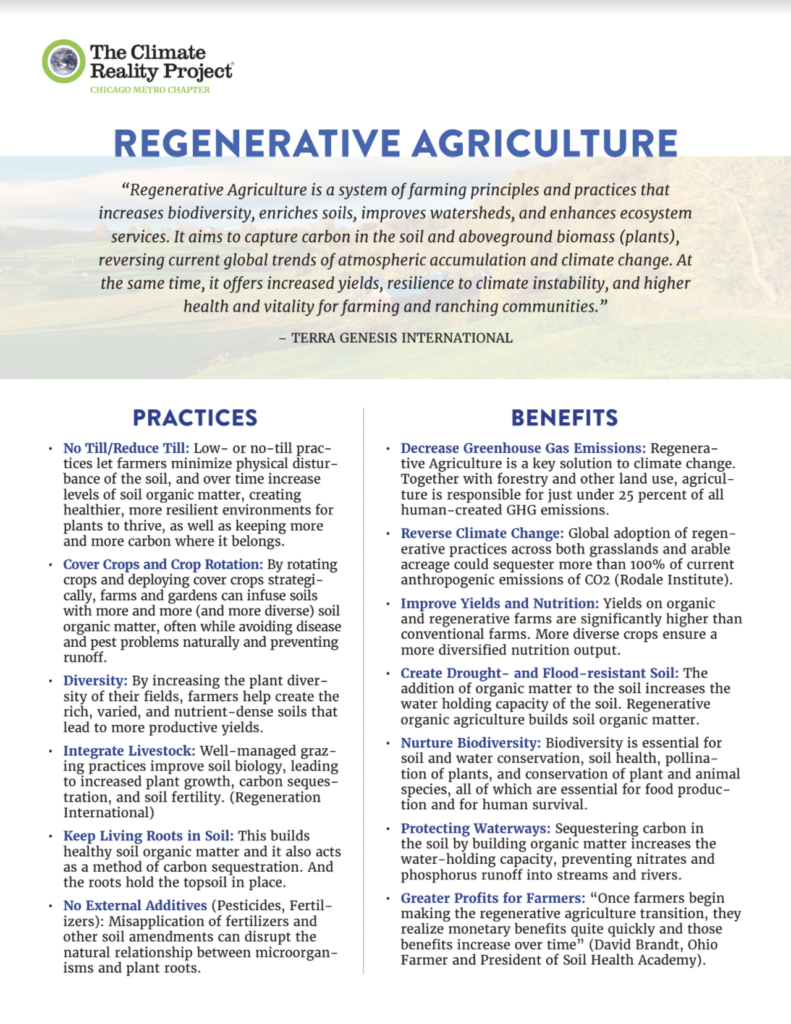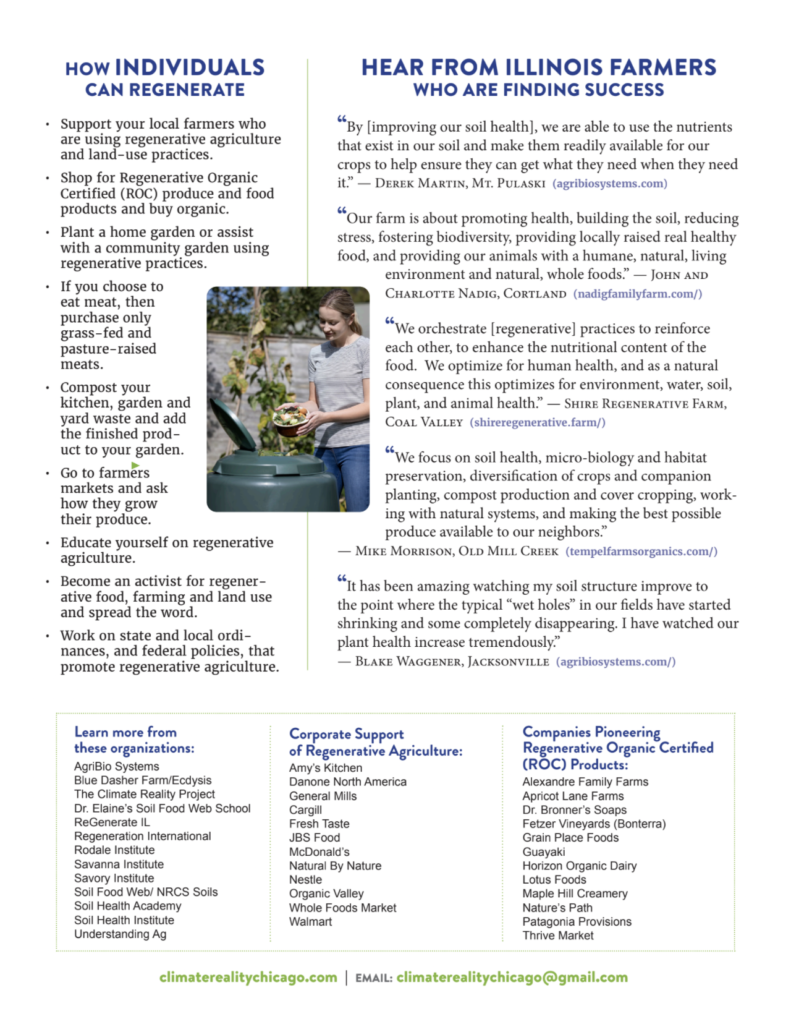
KEY ACTIVITIES
RA Team Goals:
- Focus team efforts on lobbying for the 2023 Farm Bill until passage by Congress in 2023.
- Continue to draft Regenerative Agriculture climate-smart policy recommendations for the 2023 Farm Bill.
- Educate and Create awareness of RA benefits and solutions within our CRP organization as a critical part of the Nature-Based Solutions advocacy group.
- Develop regenerative agriculture alliances with other influential farm organizations to lobby for new policies for the 2023 Farm Bill.
- Conduct regenerative agriculture presentations to educate and inform the public.
- Collaborate with other Climate Reality Project Chapters and Members to influence federal and state farm, ranch and agroforestry legislation.
Download RA Information Sheet (see images below
OBJECTIVE
To advocate and facilitate the transition of farming practices to regenerative agriculture to benefit both the environment and farmers, while restoring soil health and increasing nutrient density. To educate the public of the practices and benefits of implementing RA practices and how the can do this at home on a smaller scale. To petition members of the House Agriculture Committee and the Senate Committee on Agriculture, Nutrition & Forestry to include suppport in the form of subsidies and crop insurance for RA practices, training for NRCS staff, and technical assistance for farmers in the 2023 Farm Bill.
TEAM LEAD
Don Viecelli
» Email Don
Please note, interested attendees of our RA meetings will be invited to join our chapter.
MEETINGS
Monthly on 1st Tuesdays, 6:30–7:30pm
(Check our calendar for more details.)
MISSION / VISION
MISSION:
Our mission is to advocate and facilitate the benefits of Regenerative Agriculture (RA), Silvopasture and Agroforestry practices to farmers, ranchers, and other landowners to increase profitability, improve soil healthand food nutrient density, and combat climate change effects.
VISION:
To restore soil health as nature intended and increase the potential of regenerative agriculture to serve as a carbon sink.
^ Chapter members only
(If you’re a chapter member and still need access, click through to request to be added.)
Regenerative Agriculture Definition
Regenerative Agriculture is a system of farming principles and practices that increases biodiversity, enriches soils, improves watersheds, and enhances the entire ecosystem of the farm. Through carbon sequestration, it captures carbon in the soil by pulling CO2 out of the atmosphere to reverse the damages caused by climate change. It offers increased yields, resilience to climate instability, improved health and vitality for farming communities.
For more, see NRDC’s Regenerative Agriculture 101.
2023 Farm Bill
Agricultural Policy Changes for a Sustainable Future: 2023 Farm Bill
Climate Reality Project’s
Regenerative Agriculture Coalition
November 7, 2022
Climate Reality Project (CRP), founded by former U.S. Vice President Al Gore, is an international organization that recruits, trains, and mobilizes individuals to educate the public about climate change. Its mission is to catalyze and support viable solutions to the climate crisis by making urgent action a necessity across every sector of society. To that end, the organization has trained more than 43,000 climate leaders who work across five critical areas of focus: Just energy transition, environmental justice and public health, zero-carbon transportation, inclusive green communities, and nature-based solutions, of which regenerative agriculture is a critical part.
Members of the CRP Regenerative Agriculture Coalition have developed these recommendations for the 2023 Farm Bill to urge Congress to re-shape agricultural policy, as it shifts federal funding and resources to support farmers and ranchers to help mitigate the effects of the climate crisis through regenerative agriculture. The coalition’s mission is to have regenerative practices implemented nationwide, involving all farmers and ranchers in soil health-improving practices that can help the United States achieve carbon neutrality and reap environmental improvements in ecosystems around soil, water, and air. Healthy soil will be one of our best allies in addressing erosion, water scarcity, pollution and the health risks it brings, nutrient deficiencies in soil, the loss of biodiversity, extreme weather, endangered farmer livelihoods, and the threats of GHGs.
This is not a time for incremental change. We urge Congress to boldly reform agricultural policies and programs to meet the urgency of the moment.
Contributors: Pamela Tate, Patty Iverson, Peri Caylor, Celeste Ets-Hokin, Doreen Skardarasy
Read the entire document here.
Agroforestry/Forestry Policy Recommendations for the 2023 Farm Bill
Climate Reality Project Tree Coalition
November 7, 2022
Our planet is experiencing unprecedented natural disasters and long-term environmental degradation that threaten life as we know it. These worsening problems include extreme drought; intense storms and flooding; heat waves and wildfires; loss of biodiversity and natural habitat; soil erosion and depletion of organic nutrients; dwindling aquifers at emergency levels; toxic pollution of waterways due to agrochemicals and concentrated animal feeding operations.
American farmers are struggling with declining profitability, the environmental challenges just outlined, and counterproductive policies that make it difficult to initiate critical changes that will help them provide healthy food for the nation, maintain resilient and profitable farms, and restore the soil as a natural ally in fighting increasing extreme weather events and protecting our natural resources.
The 2023 Farm Bill offers an opportunity to increase farmers’ capacity to restore water quality, improve public and environmental health, produce more nutritious food with greater profitability, and mitigate the effects of climate change by absorbing and storing carbon in the ground and in trees and plants where it can enrich the soil.
Agroforestry involves growing trees and crops together on the same land. The trees provide shade or protection from wind and may produce wood, biomass for bioenergy, fruits and nuts, or fodder for grazing animals. Tree canopies intercept raindrops and the leaf litter on the soil surface reduces raindrop impact and soil detachment. Trees also reduce wind speed near the soil surface, which results in less wind erosion. Trees provide habitats for wildlife, increasing biodiversity, filtering water, and protecting waterways from runoff. Biodiverse agroecosystems can significantly reduce the need for and cost of herbicides due to the increased number of pollinators and the reduction of pests as compared to agricultural monocultures.
Including agroforestry as a central element of conservation practices in the 2023 Farm Bill and increasing resources for it would help ensure a just, resilient, and sustainable future. Policy recommendations that support expanding agroforestry would promote the integration of trees into the agriculture industry, resulting in healthier soil and agricultural sustainability. Increased organic matter in improved soil is better able to retain moisture, resulting in higher productivity and reduced flooding.
Contributors: Karen Daiter, Christine Dannhausen-Brun, Patty Iverson, Pamela Tate, Donna Twickler
Read the entire document here.
Regenerative Agriculture News
Oak Park Farmers Market, May 20 & 27, 2023
The opening of the Oak Park Farmers Market brought the usual droves of people to buy fresh and organic produce from farmers like the Ellis family and Chad Nichols of Nichols Farms. A great place to talk to people about Regenerative Agriculture and the Farm Bill! The average food item travels 1,500 miles, compared to the average locally produced item that travels only 56 miles (Pirog & Benjamin) so buying locally is better for your health and the environment.
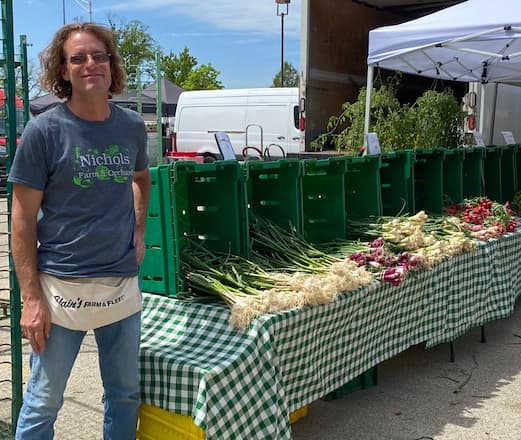

Green Garden Fair – First Congregational Church, Elmhurst, May 11, 2023
On Saturday, May 13, the First Congregational Church in Elmhurst held their annual Green Garden Fair. Locally grown, organic vegetable and herb seedlings were for sale and Master Gardeners were on hand to give advice on how to grow your summer garden. There were also free range eggs available and pastries from Synapse House “Flour to Empower” Bakery. Local environmental action groups, including Climate Reality Chicago Metro Chapter, Emhurst Cool Cities, York Eco Club, Citizens Climate Lobby, Elmhurst Bike Club, and Saving Monarchs were present to give helpful tips and advice on how to become engaged in climate-friendly activities in and around Elmhurst.
For more information, see here.
Green and Growing Summit at Chicago High School for Agricultural Sciences, May 6, 2023
The first Green and Growing Summit was a big success. In an effort to “amplify participants’ knowledge of garden, nature, and sustainability education through workshops and networking opportunities” the event brought together environmental specialists in many aspects of gardening, small and large, private and public, as well community groups working to teach others of the benefits of healthy soil and biodiversity. Climate Reality Chicago Metro Chapter had a resource table for regenerative agriculture at the summit. The speakers were inspriational, the workshops taught skills for different ages, gardening abilities, and interests. Resource tables, like Eden Place Farms, provided information that showed examples of or helped to assist in the planting of urban gardens. Each presenter, workshop and resource highlighted the benefits of green growing to the environment and community health.
Learn more here.
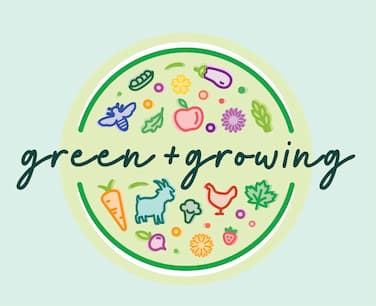
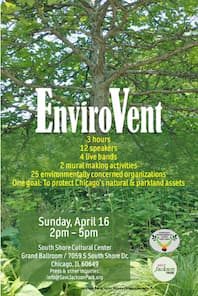
EnviroVent, April 16, 2023
By Karen Daiter
On a Sunday afternoon, environmental speakers and enthusiasts came together to discuss Chicagoland ecology in an event sponsored by the Save Jackson Park Network with assistance from Jeannette Hoyt and Uniersity of Chicago student. Karen and Pam Tate were representing Climate Reality Chicago Metro Chapter.
Speakers focused on a number of key environmental initiatives in the Chicagoland area including Climate Reality’s forcusing on tree initiatives and the variety of teams we have, migratory birds, an effort to convert the lakefront into a National Park and developing Miyawaki forests in this area. There were also resource tables presenting information about Chicago environmental initiatives, bands playing, and art projects on the environment on display.
Green City Market, January 7, 2023
By Patty Iverson
A visit to Green City Market Avondale was a wonderful surprise as I got to sample garden produce, jams, honey, and regeneratively grazed meats. While I was familiar with several of the vendors, Nichols and Ellis Farms, I was happy to learn about Mint Creek, an organic-pasture based livestock & poultry farm in Stelle, Illinois. The grazing land has been returned to wild prairie filled with grasses and perennial native flowers where animals are cared for by the Carr family and their staff.
Green City Market is the “first farmers’ market in the country to require all its farmers to be certified by a nationally-recognized third party, including Certified Naturally Grown, USDA Certified Organic, and Animal Welfare Approved, and others.” The market operates in the West Loop, Lincoln Park, and Avondale in the summer and operates indoors in Avondale in the winter.
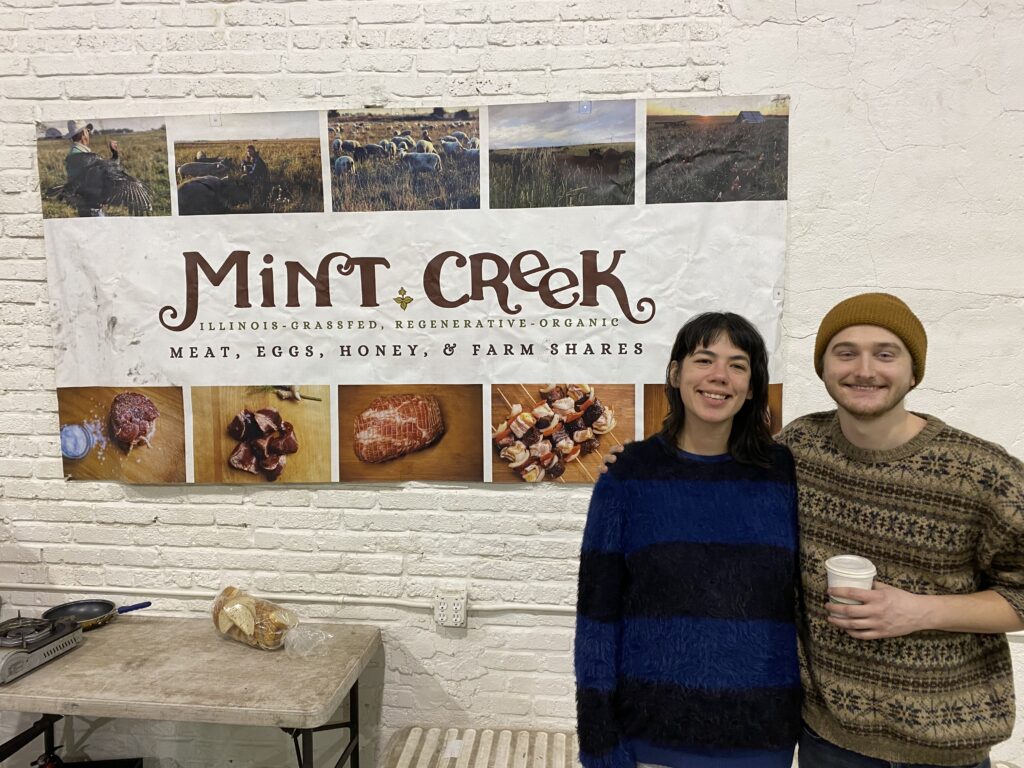

Resources
- Doug Tallamy’s Gardening for Life. October 13, 2020.
- Doug Tallamy’s Nature’s Best Hope
- CBS Mornings: Al Gore on hopes for the planet 15 years after “An Inconvienent Truth” January 13, 2022.
- New York Times: Are sheep a crucial ingredient for vineyards and ecosystems? Eric Asimov. May 12, 2022.
- Chicago Tribune: Chicago’s top fungi guy is out to save the world, one beautiful mushroom at a time. Lisa Shames. May 25, 2022.
- 2018 Farm Bill Primer
- 5 Ways to Have a More Regenerative Garden. Kiss the Ground. August 24 2021.
- Regenerate America Website
- The Soil Food Web, USDA-NRCS, Dr. Elaine Ingham Founder.
- Farmer’s Footprint Website and Documentary.


